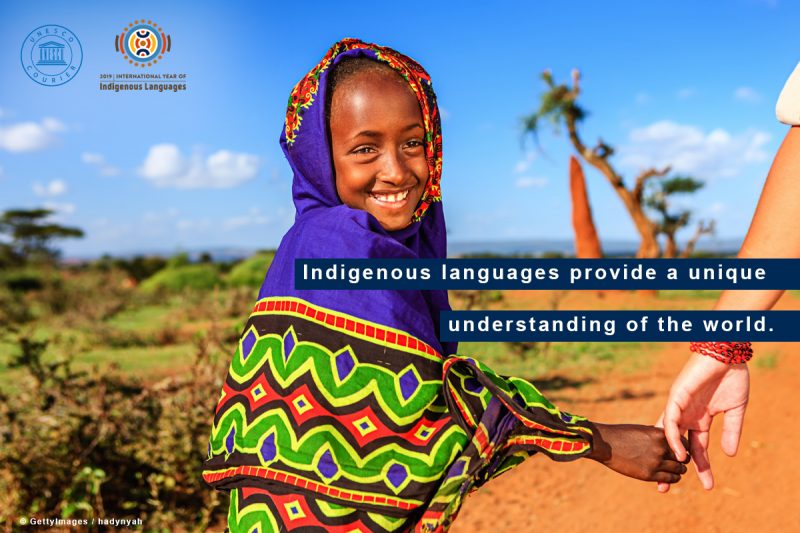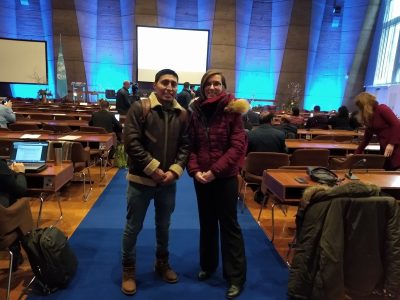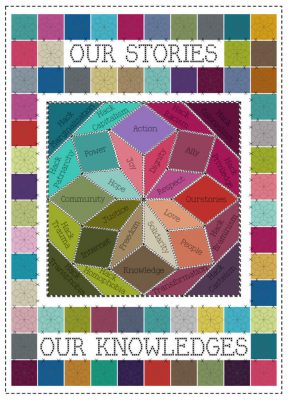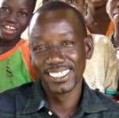Welcome back, Rising Voices’ newsletter about digital inclusion and online participation

Photo provided by the UNESCO Courier, and used as part of a partnership with the #IYIL2019 campaign.
Rising Voices note: We're pleased to relaunch our biweekly newsletter that will provide a summary of our recent blog posts about all aspects of digital inclusion including access and adoption of digital tools, as well as different ways for communities to fully participate online. Read here for previous editions of this newsletter.
The International Year of Indigenous Languages (IYIL19) is underway! Global Voices through its Rising Voices initiative is taking part as an official partner and we were present at the official launch at UNESCO headquarters in Paris on January 28th. Our colleague, Gwen Lefeuvre, the Lingua site manager for Global Voices in French was there live-tweeting throughout the day. Digital activist Juan Carlos Romero, a native Quechua speaker spoke on the panel “Establishing digital gateways for indigenous language users”.

Gwen Lefeuvre and Juan Carlos Romero at the launch of IYIL in Paris on January 28, 2019. Photo by Lefeuvre.
As part of RV’s activities for #IYIL19, we’ve organized a year-long rotating Twitter campaign and will share the voices of 50 indigenous language digital activists from Latin America to highlight linguistic diversity across the region. The first four digital activists to kick off the campaign were Yásnaya Elena Aguilar Gil, Simona Mayo, Ruben Hilari Quispe, and Irma Alvarez Ccoscco. You can follow along more at @ActLenguas (Language Activism).
Launch of the DigiGlot Newsletter
In January, we also launched the first publication of DigiGlot, a biweekly collaborative newsletter examining how indigenous, minority, and endangered language communities are adopting and adapting technology for their own needs. Subscribe here if you would like to receive the newsletter through email.
MORE FROM THE RISING VOICES BLOG
Rising Voices’ partnership with Association for Progressive Communications (APC) allows for an exchange of content related to digital inclusion and online participation. Recently, we’ve been republishing country reports from the latest GISWatch focusing on community networks, which are defined as “communication networks built, owned, operated, and used by citizens in a participatory and open manner.” Recent posts from this series on community networks have included research into community networks in the Seychelles, United States, Colombia, Kyrgyzstan, and Australia.
OPPORTUNITIES | SCHOLARSHIPS & FELLOWSHIPS
Reporters Without Borders Germany is currently accepting applications for a scholarship program, which will focus on Empowering Journalists in the Digital Field. Application due: February 19, 2019 at 23.59 (Central European Time)
The Balkan Fellowship for Journalistic Excellence is receiving applications for stories with a theme on FREEDOM. Regional journalists are encouraged to apply. Application due: March 6, 2019
CONTESTS & COMPETITIONS
The Rwanda Film Festival (RFF, aka Hillywood), organized by the Rwanda Cinema Centre in collaboration with the Kwetu Film Institute, is calling for submissions, including a special category for “Web Series”. Submissions due: May 1, 2019.
In celebration of UNESCO’s International Year of Indigenous Languages (#IYIL19), Wikimedia Norge and their partners are organizing an international Uralic language contest to create Wikipedia articles about Uralic languages and peoples. Contest period: February, 2019
TOOLS & RESOURCES
Wikipedia editors can select from several machine translation systems to support an initial article translation, Google Translate now being one of these options.
Google is introducing two Android apps that can be of assistance to those with hearing impairment or hearing loss — Sound Amplifier and Live Transcribe.
Rising Voices is partnering with Whose Knowledge?, “a global campaign to center the knowledge of marginalized communities (the majority of the world) on the internet” to republish and share their recent collection of resources focusing on building alliances and networks for the sharing of knowledge, especially among marginalized communities.

- Whose Knowledge? resource: Our stories, our knowledges
- Whose Knowledge? resource: Transformative practices for sharing marginalized knowledge
- Whose Knowledge? resource: Adding our knowledge to Wikipedia
- Whose Knowledge? resource: How to ally and be a good guest
If you would like to download “Our Stories Our Knowledges” in full, you should check out:
AWARDS
 To honor the memory of our friend Boukary Konaté, a Malian blogger and Bambara-language activist who passed away, the Doni Blog Mali, the Association of Malian Bloggers, created special awards recognizing the best of Malian blogging. Boukary was a Rising Voices grantee with his project Ségou Villages Connect.
To honor the memory of our friend Boukary Konaté, a Malian blogger and Bambara-language activist who passed away, the Doni Blog Mali, the Association of Malian Bloggers, created special awards recognizing the best of Malian blogging. Boukary was a Rising Voices grantee with his project Ségou Villages Connect.
UPCOMING EVENTS & CONFERENCES
Registration is now open for the 12th Ibero-American Colloquium of Digital Journalism, a free event hosted by International Symposium on Online Journalism. Date: April 14, 2019 / Location: University of Texas at Austin
ADDITIONAL READINGS ABOUT DIGITAL INCLUSION & ONLINE PARTICIPATION
- The first month of Cuban 3G mobile Internet service by The Internet in Cuba blog
- Connecting Rural Appalachia with Community-Owned Broadband by Mozilla
- Beyond Internet access: seeking knowledge justice online by Kira Allmann & Anasuya Sengupta on Open Global Rights
- Why African Languages? (an Africanist linguist’s blog on West African languages)
- A Project Will Provide Free Internet in Public Spaces of Costa Rica from the Costa Rica News
Subscribe to the Rising Voices Newsletter
Support our work
Since Rising Voices launched in 2007, we’ve supported nearly 100 underrepresented communities through training, mentoring, microgrants and connections with peer networks. Our support has helped these groups develop bottom-up approaches to using technology and the internet to meet their needs and enhance their lives.
Please consider making a donation to help us continue this work.



